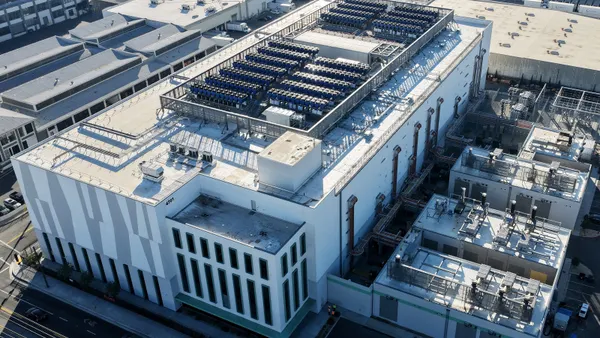Dive Brief:
-
Despite growing concern about the impact of artificial intelligence on demand for electricity — and for fossil fuel generation — NVIDIA CEO Jensen Huang said Friday that AI would help the world achieve decarbonization.
-
Although it initially requires vast amounts of energy to train, AI is more efficient in the long-run than conventional computing, Huang said. He also argued that AI could be integrated into the grid to deliver power more efficiently.
-
U.S. data center load is expected to grow to nearly 21 GW this year, up from 19 GW in 2023, according to a Federal Energy Regulatory Commission report this month. Data center electricity demand across the U.S. is expected to climb to 35 GW by the end of this decade, according to the FERC report. Huang said this growth should be seen as a sign of prosperity.
Dive Insight:
AI should be seen as a potential climate solution, Huang said Friday during a webinar hosted by the Bipartisan Policy Center.
“Using artificial intelligence to solve problems will use less energy than using calculation to solve problems,” Huang said.
For example, he said that an AI model can predict the weather a thousand times more efficiently than conventional computing. Although it will take a significant amount of energy up-front to train the AI, he said, once that model is created it could be used repeatedly all around the world, ultimately resulting in energy savings relative to conventional computing processes.
AI could be used to upgrade the grid and enable it to “redirect energy in a smarter way,” and could perhaps improve carbon capture and sequestration technologies, Huang said. However, he acknowledged that any efficiency gains created by AI would likely be absorbed as society assigns a greater number of tasks to AI.
“Society will apply the energy saved to something else, and we call that prosperity and economic growth, the improvement of quality of life, which we want to see,” Huang said. “The fact of the matter is, on an absolute basis, I hope that the population of earth consumes more energy someday. Because it's directly related to quality of life. We want everyone to enjoy this quality of life.”
EPRI in May estimated data centers could consume 9% of the United States’ electricity generation by 2030 — double the amount consumed today.
Huang also expressed support for a recent deal between Constellation Energy and Microsoft to reopen the Three Mile Island nuclear power plant, saying that the world will need all available sources of energy.
“No one energy source will be sufficient for the world,” he said.
But instead of trying to build new transmission to move electricity to areas of higher demand, Huang said the U.S should focus on building data centers in areas where energy is already abundant. AI could even be thought of as a form of energy storage, he said.
“Instead of transporting the energy to where we need it, let's transport the data center to where there is an energy source,” he said. “We can build a data center anywhere. The computer doesn't care where it's going to school.”














